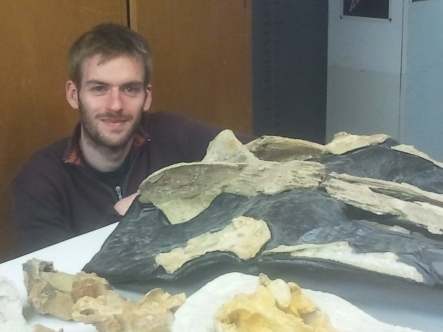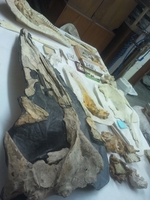
Felix Marx with some of the whale fossils at the University of Otago's geology department collection (images: V. Meduna)
For palaeontologists, whales are among the most interesting animals. They belong to a small group of mammals which made an evolutionary U-turn, changing their bodies back into a streamlined shape fit to live underwater. How whales managed to return to the sea has baffled even the greatest minds in evolution. In the first edition of Origin of Species, Charles Darwin proposed that whales had evolved from swimming bears, but he was ridiculed for this idea and decided to delete it from later editions. Nearly a century later, the 20th-century palaeotologist George Gaylord Simpson was still at a loss. Whales, he said, were the "most peculiar and aberrant of mammals".
 It is this description that sparked the interest of Felix Marx, who recently completed his PhD on the evolution of whales with University of Otago palaeobiologist Ewan Fordyce. He studied the whale fossils Ewan has collected in New Zealand and Antarctica over many years (a few examples are pictured on the right) as well as specimens from other parts of the world and was able to show that the diversity of fossil whales matches periods of evolution and diversification of diatoms, a prominent group of tiny algae that form the base of the marine food web. By analysing oxygen isotope records (a chemical fingerprint of oceanic temperature and global ice volume), Felix also uncovered that shifts in ancient climate during the period when Antarctica became isolated from other southern landmasses provided another evolutionary force. In conclusion, Felix proposes that food abundance and climate change drove the evolution of modern whales into the many species we know today.
It is this description that sparked the interest of Felix Marx, who recently completed his PhD on the evolution of whales with University of Otago palaeobiologist Ewan Fordyce. He studied the whale fossils Ewan has collected in New Zealand and Antarctica over many years (a few examples are pictured on the right) as well as specimens from other parts of the world and was able to show that the diversity of fossil whales matches periods of evolution and diversification of diatoms, a prominent group of tiny algae that form the base of the marine food web. By analysing oxygen isotope records (a chemical fingerprint of oceanic temperature and global ice volume), Felix also uncovered that shifts in ancient climate during the period when Antarctica became isolated from other southern landmasses provided another evolutionary force. In conclusion, Felix proposes that food abundance and climate change drove the evolution of modern whales into the many species we know today.
Veronika Meduna meets Ewan and Felix in the basement under the university's Geology Museum to see some of the relevant fossils and to talk about another project on the pigmy right whale, a rarely seen baleen whale, and its position in the whale family tree.

Felix Marx, in blue at left, and Ewan Fordyce, in orange at right, cutting through Otekaike limestone on a South Canterbury farm to recover a fossil whale that lived some 24 million years ago (images: University of Otago).

